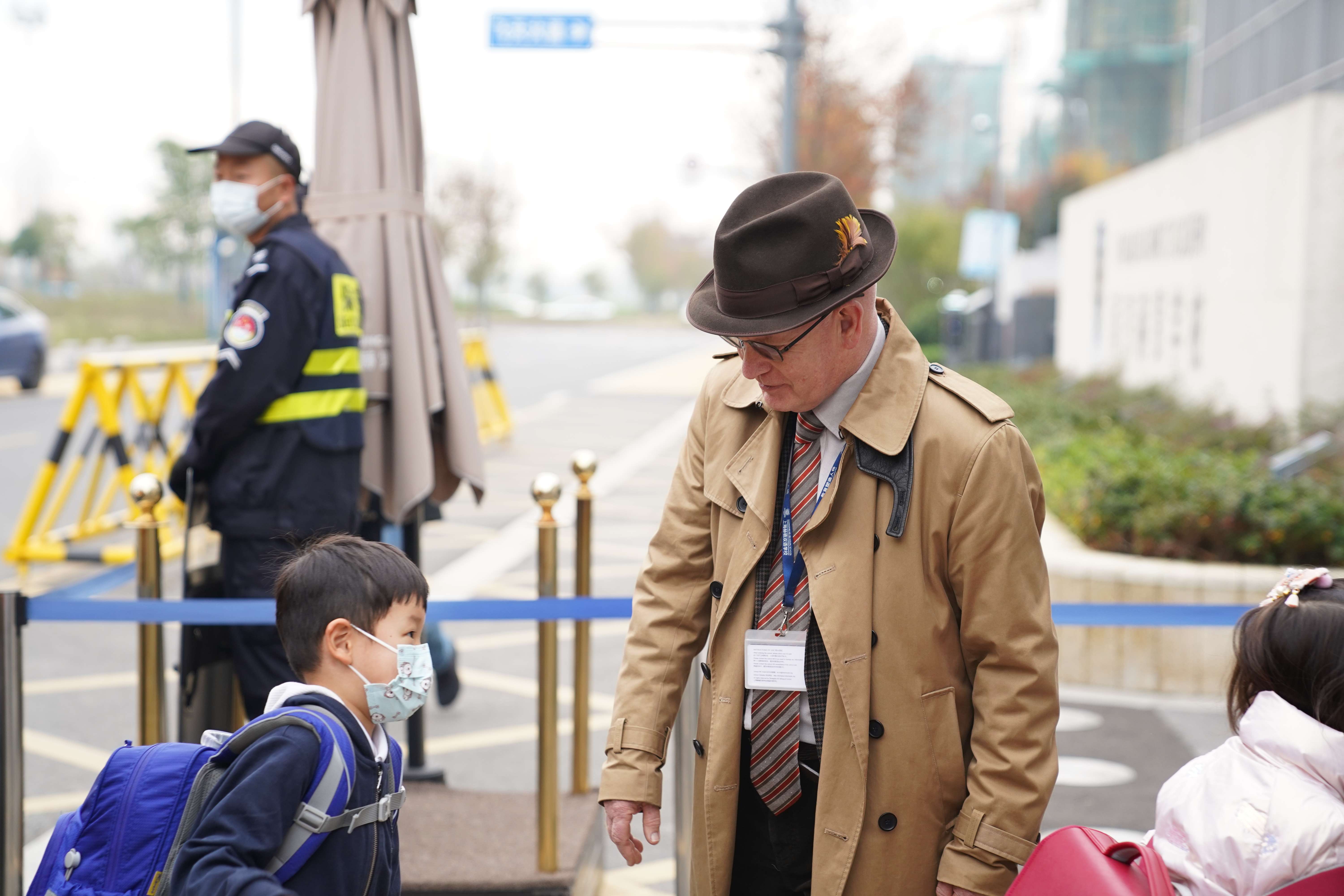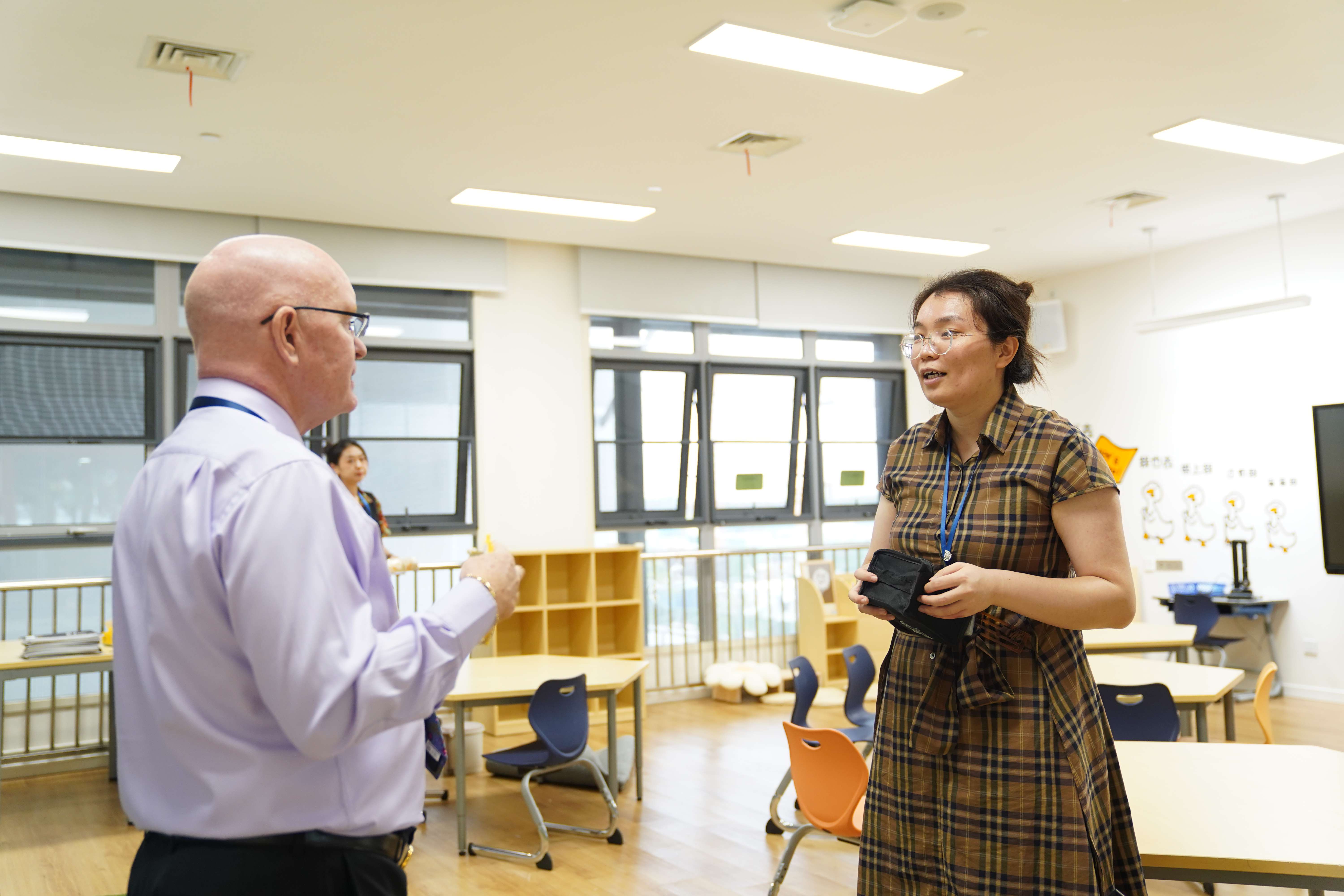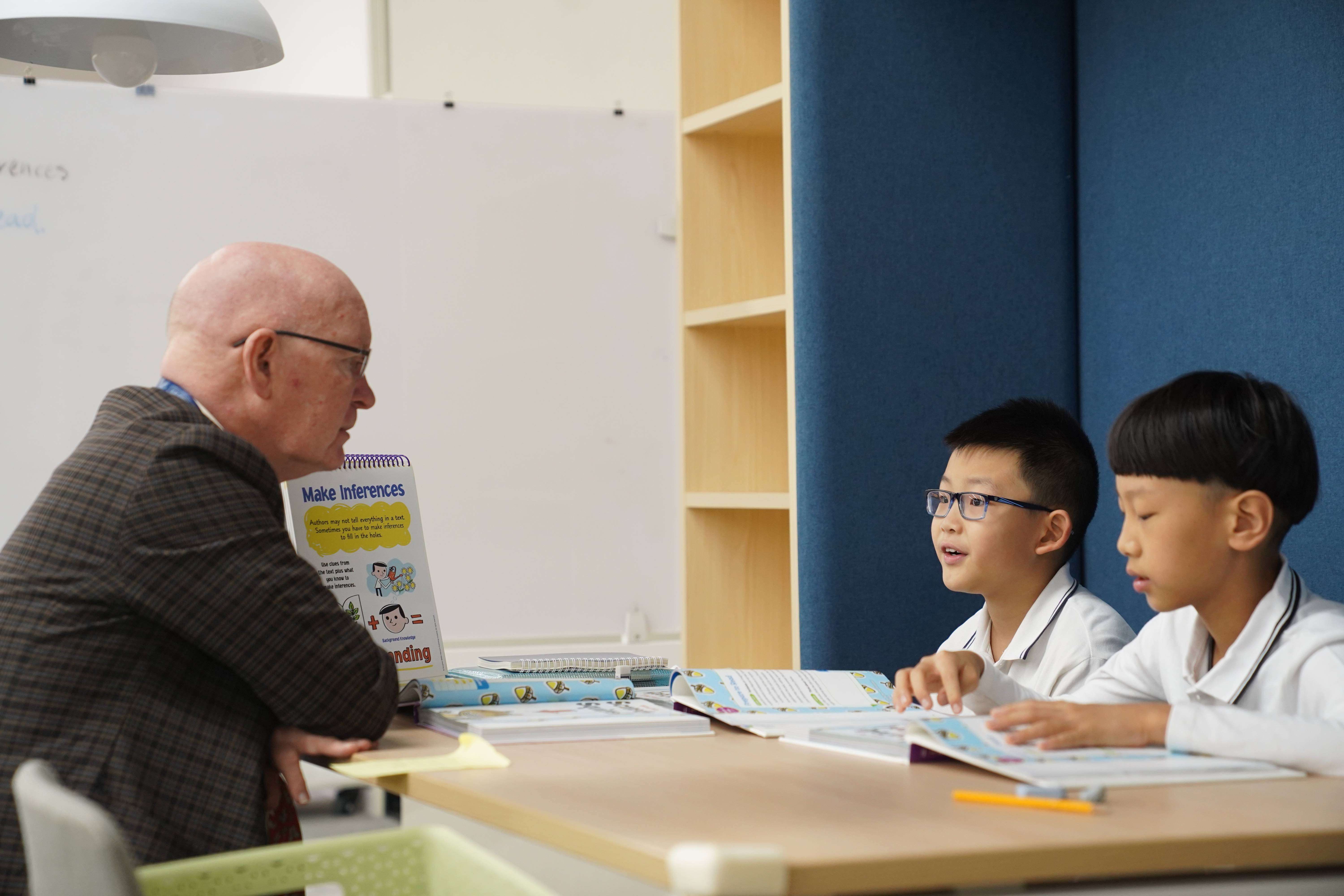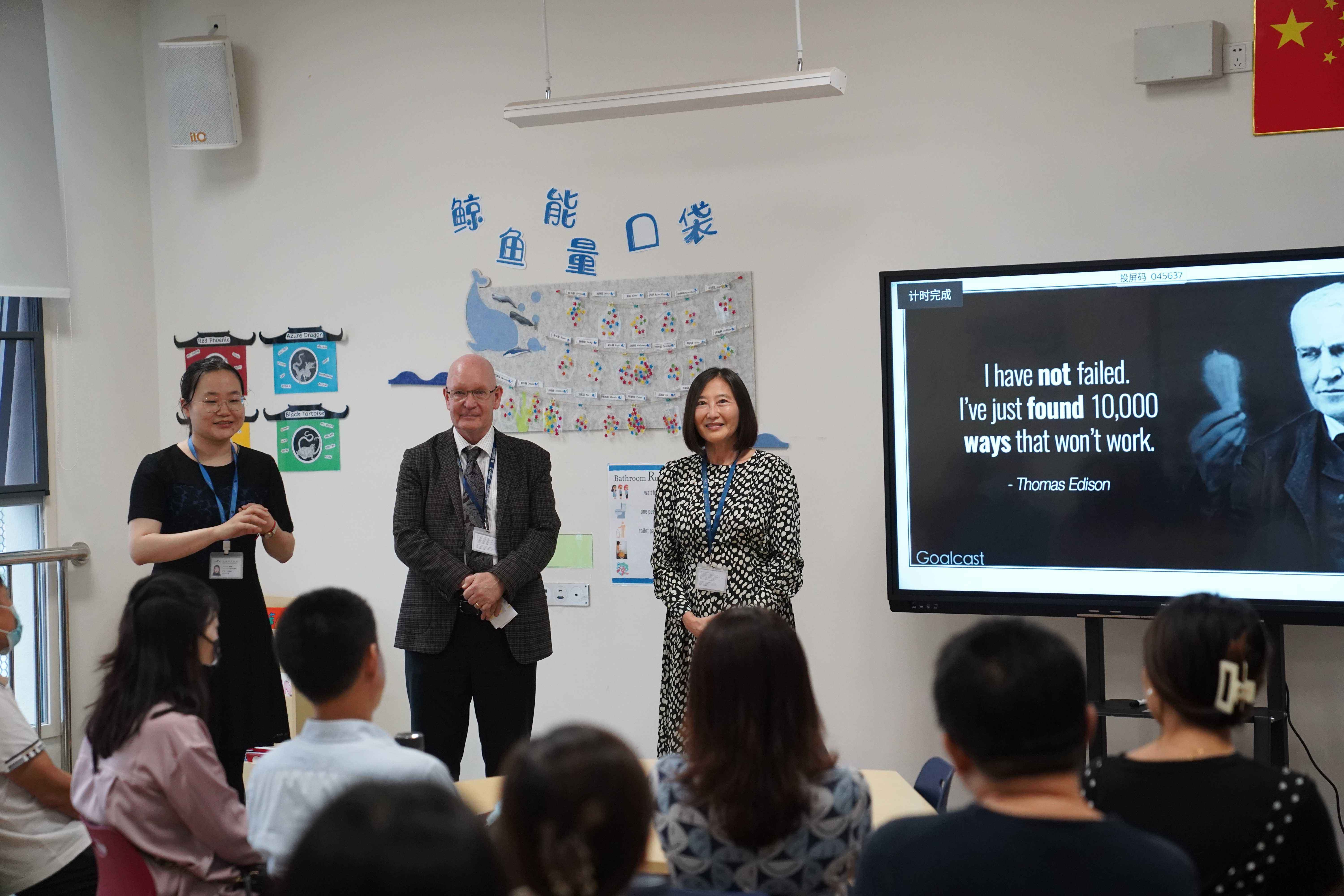

With over 40 years of international education and numerous achievements under his belt, what can he bring to Nanjing?
In September this year, HTNIA welcomed another heavyweight educator in the field of bilingual education in China - Warren Johnston, who is the pioneer of bilingual education in China, what new ideas and actions does he bring to HTNIA? Today, we are going to listen to Mr Johnston's story of education and his vision of international education for Chinese children.

Part'1
If you regularly send your child to school in person at HTNIA, you are sure to see a kindly old grandfather at the entrance to the campus in the morning, waving hello to every child who walks in. Although the winter in Nanjing is exceptionally wet and cold, this is still something that Principal Warren always insists on, so that every child feels the attention and love from their teacher from the moment they step onto the campus. It is hard to imagine that you are standing in front of a leading figure in Chinese bilingual education.
Principal Warren entered his first classroom in 1981 with over thirty Year 3 children in front of him and has been teaching for over forty years since. Before coming to China, he spent several years working on the New Zealand National Primary Mathematics Curriculum and curriculum design, and in 1999, a chance visit to an international school in Hong Kong, China, opened the door to a new world of international education and inspired him to return to teaching.
Principal Warren, who first came to China, has worked at Derry International School in Hong Kong for seven years and has been Headmaster for four of those years. He enjoys the multicultural teaching atmosphere where you can see Chinese, German and Swiss children learning and interacting together and sharing their respective cultures in the school. "It's a difficult thing to run a school in this multicultural context. We are divided into a German department, which is taught in German, and an international department, which is taught in English. And we have almost a third of Chinese children, so we had to offer a separate Chinese subject." The fact that it is clearly a school established in China, but the children it teaches who do not speak Chinese and who do not have a strong sense of Chinese cultural identity, provoked deep thoughts in his mind.
So he decided to come to Shanghai to find his ideal education. At that time, Shanghai was the most developed city for 'international education' in mainland China, with countless international schools, all taught in English and with a strong international atmosphere. It was against this background that the first truly 'bilingual' school in China, the YK Pao School, was established. It pursues a 'whole-person education' that is truly 'a blend of East and West'. Unlike many international schools that use foreign curriculums to teach Chinese children, its integrated Western and Chinese curriculum allows every student to be immersed in a rich bilingual and multicultural environment.
Principal Warren is the founding headmaster of YK Pao School. He was an upbeat, imaginative and creative person who also understood children, and he designed many activities that "lasted". He loved spending time with the children, welcoming them at the door, teaching them lessons, reading to them or simply sitting at the back of the class and watching. This was a habit that stayed with him for twenty-two years.
"What did the bald headmaster love to do? He loves to wander around the school corridors with his hands in his pockets, and when he spots children who are breaking discipline, he reaches out his furry arms and grabs them. If he caught them, they would be docked playtime or they would have to stay at school with the headmaster and not go home. With such a powerful tactic, even the naughty children become polite and good students." --from The Bald Headmaster - School of Wonder - Pinyin Version
The author of Big Head Son, Little Head Dad, Mr. Zheng Chunhua, took this experience to heart and wrote about it in his book. His school is called "The School of Wonder" by the author and he himself is the "bald headmaster" of "The School of Wonder".
Leading YK Pao School to become one of the best bilingual schools in China, and talking about why he left YK Pao School, Principal Warren said, "I am a person who likes a challenge and I like the feeling of creating something from scratch. So in a cafe on Jiangsu Road I met the three founders of Yige Education Group, who wanted to do very much the same thing as I did, which was to find an international education for Chinese children."
And so a year later, a new legend rose from the ground in Ningbo. At HD Ningbo , Principal Warren's vision for education was once again realised when he met the Integrated Chinese Curriculum team, led by Li Zhencun. The Integrated Chinese Curriculum aims to nurture the 'whole person', covering 'all of school life' and promoting the full integration of subjects, bringing students solid Chinese literacy and cultural literacy skills. Its educational philosophy, teaching methods and curriculum design coincide with that of the foreign curriculum led by Principal Warren, and this is the other half of Principal Warren's search for "East meets West".

Part'2
As the head of a bilingual school, both at the charter school and at other HD schools, Principal Warren's biggest challenge was to bring together two very different cultural teams, Chinese and foreign. In the early days of the school, Principal Warren spent a lot of time trying to reconcile the two teams. "The foreign team thought that weekends were for the family and should not have homework. The Chinese team, on the other hand, thought that a weekend review would better help students consolidate what they had learned. These are just small details, but you need to pay attention everywhere so that the two teams can understand each other and work well together."
"Many schools have very good foreign teams and Chinese teams, but they have their own way of teaching and they are split between the two." Since coming to HTNIA, and with the experience of success at other HD schools, Principal Warren has done a lot to bring the two together. "Our Chinese curriculum and foreign curriculum are both theme-based, we will have different themes and we try to unify the content of the Chinese and foreign curriculum. For example, when G4 were doing the seed curriculum, we would add English stories and science studies to the foreign curriculum so that the two could work together and complement each other."
Having been in Nanjing for over a year now, Warren believes that parents in Nanjing are more concerned about their children's education and that parents want to know how they can help their children grow up. In his eyes this is a great thing "You know, in a lot of families in New Zealand or in the UK, parents don't care what their children do when they grow up, they leave them free to choose, and that leads to a lot of children not having their own goals and even going on to do bad things." Parents and schools share the same expectations and goals, which is crucial in education.
Making school and home one. This is why Principal Warren has spared no effort in running the PTA, one-to-one parent meetings and parent wisdom classes since arriving at HTNIA. Getting the kernel of our curriculum across to parents so that they can come into the school, see what the children are doing and understand why we do what we do. "Parents want to be involved in the school, not just drop their children off at school. That's when we need to open the doors and welcome them and get them involved in these things we're doing together."

Part'3
This is Principal Warren's 23rd year in China and he confesses that he has forgotten what New Zealand is even like. He has started a family in China. "The children's mothers teach them Chinese and even the local Hunan dialect, and I talk in English, so the children are confident and able to switch back and forth between the two languages." Being in a family where East meets West has also given him a deeper understanding of bilingual education.
The conventional wisdom is that the higher the percentage of English, the better. Principal Warren, on the other hand, believes that bilingual education must be discipline-integrated, have clear rules and be based on rigorous theory. The mother tongue is the foundation of all language learning. For the vast majority of Chinese children, Chinese is used as a first language and most of the time in a monolingual environment. It is only when children learn to handle their mother tongue that they can organise their thinking, their cognitive learning and understand how to interpret the rules of the language and the methods of analysis, induction and learning. This is also important for the child's sense of identity and belonging. This is where the problem of bilingual education in the past, where English was emphasized at the expense of Chinese, comes in.
Conventional wisdom holds that the path to learning is fixed. We habitually split the curriculum from easy to hard, with an emphasis on listening and reading at younger ages, and then adding reading and writing as children get older. However, Principal Warren believes that the learning pathway is individual and that children need highly personalised support for their development. The arrival of Principal Warren has expanded the number of groups in RWI to six, and he is leading one of these groups himself. With 5-6 children of similar ability levels studying in a group, it will be easy for the teacher to provide an individual programme for each child.
Children also need consistent practice in writing in English. At an early age, we tend to focus on developing children's reading and communication skills, but lack opportunities to write, but children also need to practice writing. Think about how strong a writer they will be when they go to university abroad and are faced with their first 1500 word essay or more, a coherent, professional, and logical essay that requires a lot of thought. When they want to try a major such as humanities or criminal psychology, they will find that their writing skills still need a lot of work. So we have to keep writing, and that's where they apply their grammar skills, otherwise they're just learning English skills to pass their exams.
We want to give our children a strong foundation in Chinese culture but with an international perspective. I want our students to have not just knowledge, but a variety of abilities to deal with the future. So that when they are faced with a choice, they can deal with it comfortably, whether it is an excellent university at home or abroad. More than that, we want them to have the ability to cope with more choices than just the mathematics and science subjects that Chinese children often choose, but perhaps the arts, drama, economics, philosophy that they love ......

He loves a challenge, so he always leaves a school when it is brilliant, and starts from zero again to see the next great one being born. He has come to Nanjing with a philosophy of "learning from the best and combining the best of East and West" and hopes to take Nanjing's international education to a new level.
With over 20 years of experience in bilingual education management, he has witnessed the development of bilingual education in China from scratch and has become convinced of the future direction of international education.
Although he is the oldest person in his year on the whole campus and you can see him waiting for the children at the school gates in the early morning and in the evening you can meet him in the dormitory discussing problems with the secondary school students in the evening study, he is still a fearless explorer with a young heart.





